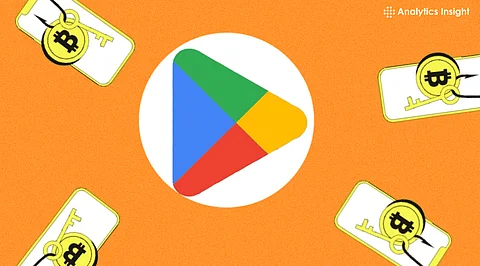

Crypto-phishing apps on Google Play Store pose a serious threat to mobile users. These apps mimic real platforms to steal login credentials.
Users must check app reviews, permissions, and developers before installing any crypto-related app.
Google removes harmful apps once flagged, but early downloads may still cause losses. Caution is essential.
Cybercriminals are constantly evolving their tactics, and a new threat has emerged: crypto-phishing apps masquerading as legitimate tools on the Google Play Store. Crypto investors and newcomers alike need to be vigilant to protect their digital assets from these sneaky scams.
These phishing apps can secretly steal login credentials and private keys, potentially draining your entire wallet in the worst-case scenario. Here's a quick rundown on how they operate and essential tips on how to protect yourself.
Crypto-phishing apps are fake cryptocurrency applications that mimic the name, logo, or interface of popular wallets and exchanges to appear authentic. After installing these apps, they trick users into entering sensitive information such as private keys or wallet recovery phrases. These data go straight to the hacker, leading to the loss of all the funds in minutes.
Also Topic : Top Google Play Store Apps in 2025: Best Android Apps for Messaging, Gaming, and Productivity
These apps often sneak past Google's primary security checks. Developers submit apps that initially appear authentic, and once live, updates add hidden malicious code.
To gather more data, some apps may request unnecessary permissions such as access to contacts, SMS, and files of the user.
Cybersecurity firm ESET, in early 2025, detected multiple crypto-phishing apps that mimicked popular wallets, including Phantom, MetaMask, and Trust Wallet.
According to the latest analysis, within the past three months, more than 30 fake crypto wallet apps have been reported on the Google Play Store. They had names like:
MetaMask Wallet Pro
Phantom Wallet Mobile
Trust Wallet Safe App
All these fake apps had logos similar to the authentic ones. Most had 4-star reviews, and many of them were fake. Some of these apps were installed over 10,000 times before their removal from the Play Store.
Once installed, these apps are capable of:
Stealing wallet recovery phrases
Managing clipboard data (where many people copy keys)
Recording screen activity
Capturing screenshots or keystrokes
Redirecting transactions to hacker-controlled wallets
These actions can result in a significant financial loss.
Also Read: India Blocks 119 Apps Linked to China and Hong Kong on Google Play Store
It’s not difficult for scammers to fool users with a well-polished app. But there are signs to watch for:
Suspicious Developers: If the app is not published by the official company, it’s better to avoid it.
Typing and Grammatical Errors: Many fake apps have poor language and grammatical errors.
Asking for Unusual Access: If a wallet app asks for contact access, it’s suspicious.
Low Number of Reviews: If an app has fewer than 100 genuine reviews, it’s a sign.
Unimaginable Features: Promises of high returns or free tokens are red flags.
Smart practices can save hard-earned digital assets from crypto scams.
Installing Only Official Apps: By using links from the wallet or exchange’s authorized website.
Using Two-Factor Authentication (2FA): To add a layer of security, even if login data is compromised.
Avoiding Store Recovery Phrases Digitally: It’s better to write them down on paper and not on the phone.
Checking Permissions: Denying access to features that aren’t required for mobile security.
Using Reputable Antivirus Software: Many of them now flag malicious mobile apps.
Google is familiar with the growing threat, and its Play Store security team regularly removes malicious apps. However, before removal, these fake apps remain in the Play Store for several days or weeks. Thousands of users may already be targeted during that time.
That’s why staying alert is important, as relying only on the platform’s vetting process isn’t always enough.
Cryptocurrency adoption is increasing among the Indian and global population. Statista says that last year, India had over 115 million crypto users. Scams are rising with more people entering the space because cyber criminals know that mobile is the preferred platform for many.
So, these scams will only become more innovative, and staying alert now means protecting one’s financial future.
